IAHS News
Call for Nominations: Deputy Secretary General (IAHS)
The International Association of Hydrological Sciences (IAHS) invites nominations/applications for the newly established temporary position of Deputy Secretary General to support the President and contribute to the effective coordination of Association activities.
Role & Term
· Position: Deputy Secretary General.
· Purpose: The Deputy Secretary General will assist the President in following the ongoing initiatives and activities across IAHS, ensuring effective communication and coordination within the Association. The Deputy will shadow the role of the Secretary General. The Deputy will also be expected to act on behalf of the Secretary General when the latter is temporarily unable to attend events or carry out specific duties due to unforeseen circumstances. This role is designed to complement, not duplicate, the functions of the Secretary General, fostering continuity and efficiency in the operation of IAHS governance.
· Term: 2 years
· Compensation: Voluntary (unpaid)
· Expenses for attending events to represent IAHS possible where the Secretary General is unavailable (subject to approval)
Eligibility
Candidates should demonstrate previous experience with IAHS or with comparable scientific/professional organizations (e.g. as an IAHS Bureau member, Commission Officer, leader of an IAHS initiative or HSJ Editorial Board member). A strong commitment to IAHS’s mission and the ability to collaborate effectively across the Association are essential. Excellent communication, time organisation, team working, and diplomacy skills are important qualities for the role.
Appointment
Following the close of the call and review of submissions, the President will make the appointment from the pool of eligible applicants.
How to Apply
Please submit:
· A curriculum vitae highlighting experience within IAHS (or similar organizations).
Send applications by email to the IAHS Secretariat: [email protected] with subject line: Deputy Secretary General – Application: [Your Name]
Deadline
The call will remain open for 15 calendar days from the date of publication, closing at noon GMT on 13 November 2025.
Queries
For questions, please contact the IAHS Secretariat at [email protected] .
Special Issue in Hydrological Sciences Journal!
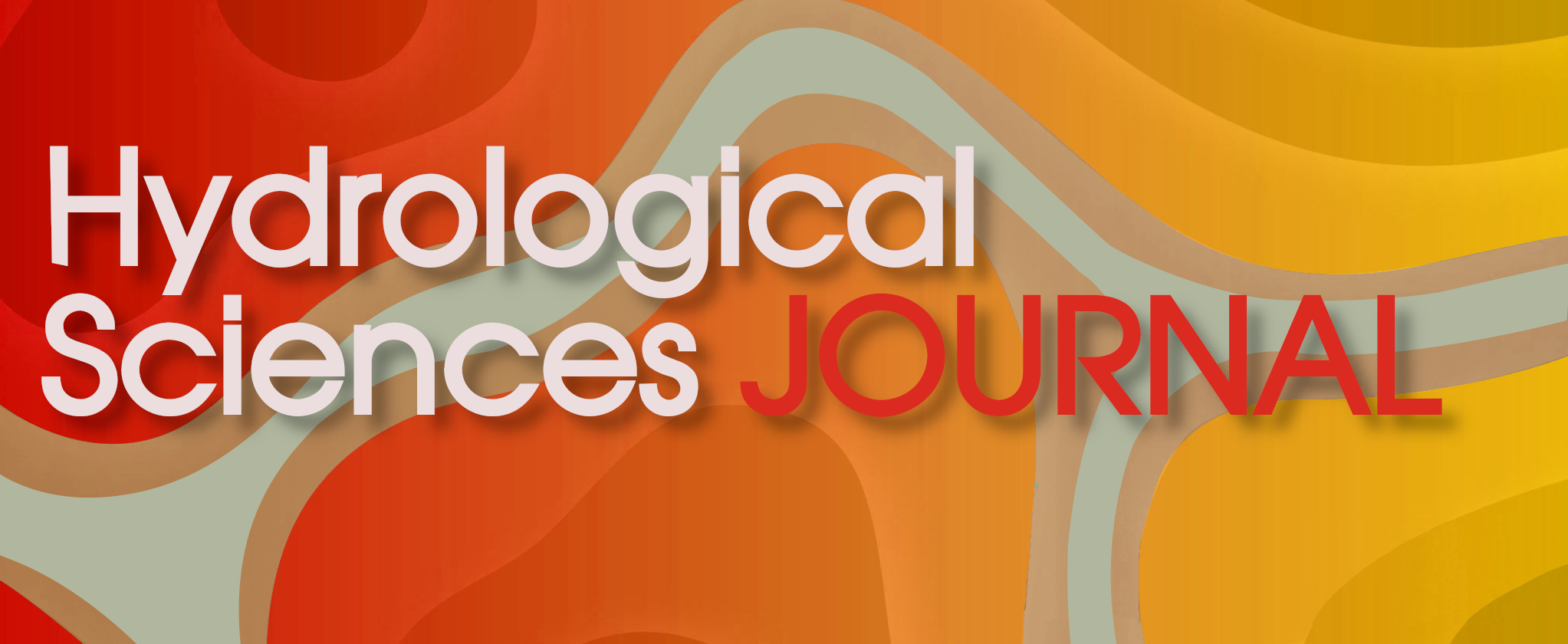
Contribution of isotope hydrology to water sciences in Africa: Revisiting foundations and exploring new research trends.
There’s still time to submit to this special issue which aims to consider isotope applications over the continent of Africa, examining new research trends and the challenges facing isotope hydrology applications. It will showcase innovative solutions and success stories and aims to promote an exchange of ideas and knowledge, as well as inspiring a new generation in using isotope hydrology to investigate environmental issues. We aim to promote a greater interest among water managers and the isotope hydrology community in Africa in the efficiency of using environmental isotope tracers for water resource studies.
Submit an article here.
Abstract deadline: 31 October 2025
Manuscript deadline: 31 December 2025.
Special Issue Editor(s):
Aldo Fiori (Co-editor), Roma Tre University, Italy
Frédéric Huneau (Lead Guest Editor), University of Corsica, France
Bertil Nlend (Further Guest Editor), University of Douala, Cameroon.
The Digital Water Globe (DWG) is evolving!
We’d like to hear from you about how you currently use the Digital Water Globe (DWG), what could be improved, and what features you’d like to see in Digital Water Globe (DWG) 2.0. Your feedback will help us shape the future design and functionality of this collaborative hydrological platform.
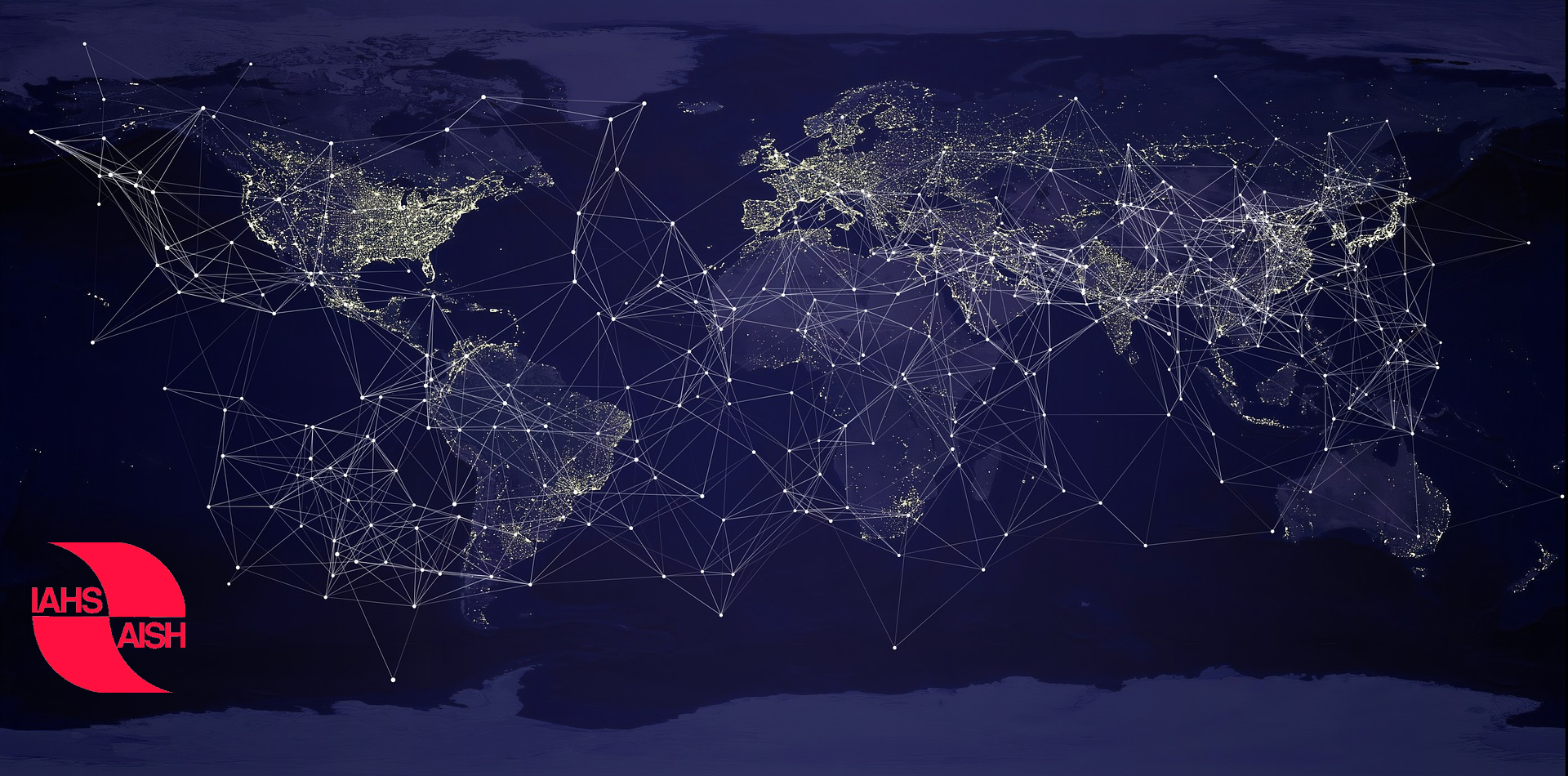
IAHS Academy Deadline Extended
The application deadline for the IAHS Academy 12-18 January 2026 in Ningbo, China, has been extended to Friday, 31 October 2025.
IAHS Academy 2026 in Ningbo, China
The IAHS Academy features five short courses in parallel fostering a critical mass of lecturers and students in the same week and venue. This coming January 2026, in Ningbo, you will have the chance to select among five topics providing advanced scientific, applied research training and hands-on.
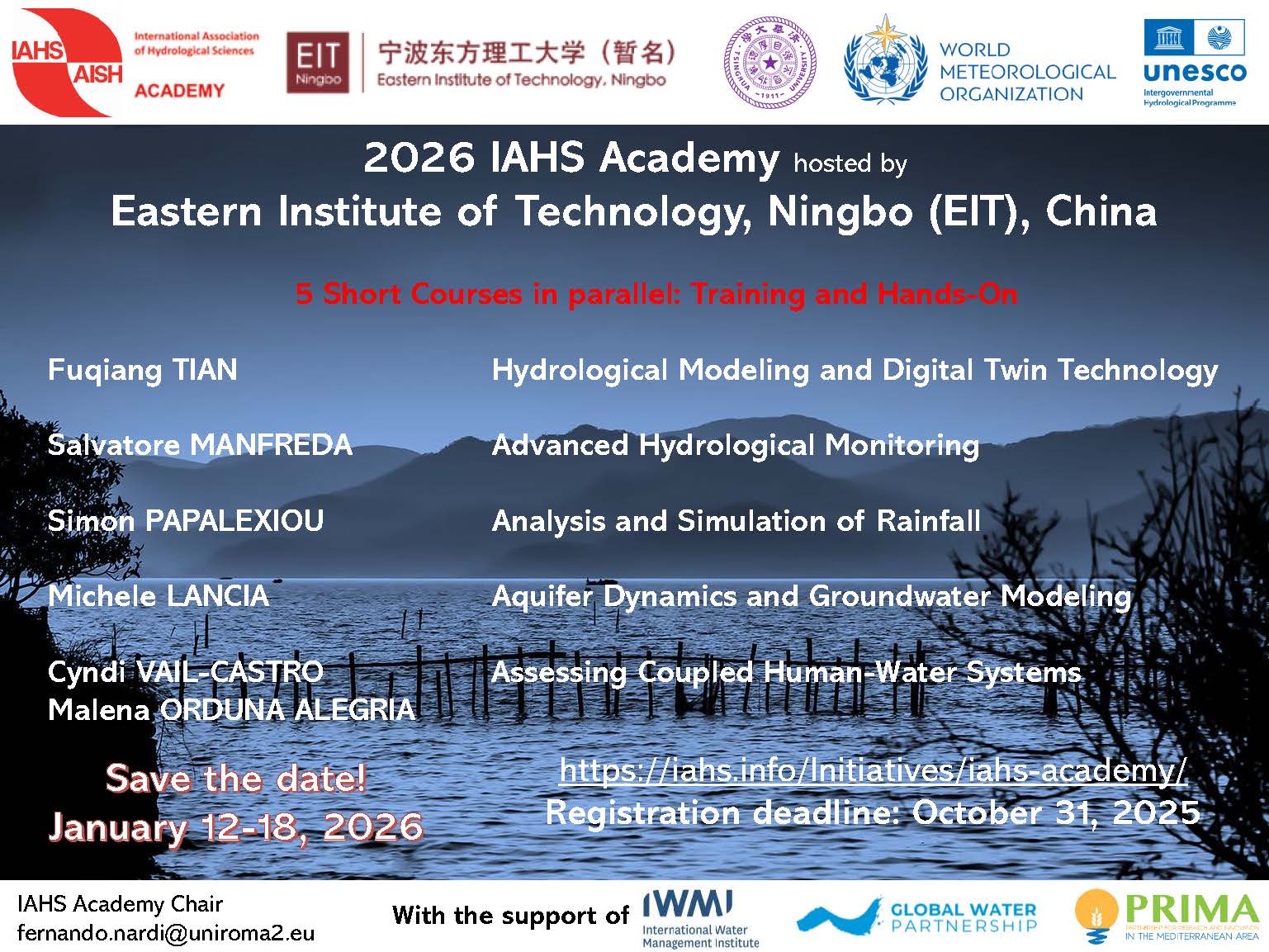
Lecturers and topics
Fuqiang Tian: Hydrological modeling and digital twin technology
Salvatore Manfreda: Advanced hydrological monitoring
Simon Michael Papalexiou: Analysis and simulation of rainfall
Michele Lancia: Aquifer dynamics and groundwater modeling
Cyndi Vail-Castro & Malena Orduna Alegria: Assessing Coupled Human-Water Systems.
How to apply
PhD students and young researchers are invited to apply to join the 2026 IAHS Academy by completing and submitting an application form. Applicants shall provide the selected topic, all biographical information, and attaching a resume for the Academy steering and LOC committees to evaluate and consider your applications. Applications will be evaluated and the applicants will be assigned the selected short courses until maximum capacity of 25 participants per topic is reached. Application deadline is Friday 31 October 2025.
Wrap-Up on the IAHS 2025 Scientific Assembly in Roorkee, India
Here’s a look back at the IAHS 2025 Scientific Assembly in Roorkee!
Between 5 and 10 October 2025, the XIIth Scientific Assembly of the IAHS brought more than 600 hydrologists together in Roorkee, India – a university town nestled between the River Ganges and the foothills of the Himalayas.
Hosted on the beautiful campus of the Indian Institute of Technology (IIT) Roorkee, the week was filled with lively discussion, new ideas, and lasting connections. Hydrologists from around the world gathered to share research, exchange experiences, and celebrate our shared mission of advancing hydrological science.
One of the stand-out features of IAHS2025 was its fresh new conference format, designed to foster collaboration and encourage more open discussion across disciplines and generations.
The programme was rich and varied, from inspiring scientific sessions to memorable community moments:
The SYSTA awardees were celebrated at a special luncheon on Monday, recognising the energy and ideas of the next generation of hydrologists.
The HSJ Retreat and dinner on Monday evening featured the Hydrological Sciences Journal Associate Editor Award for 2024. Marina Batalini de Macedo was awarded the prestigious Hydrological Sciences Journal Associate Editor Award at a dinner in India last night. The award is granted for outstanding overall contribution to the Journal’s impact and visibility, and excellence in supporting authors and editors through the peer review process. The award is granted annually by IAHS - International Association of Hydrological Sciences, with the support of Taylor & Francis Group, to one Associate Editor identified by the HSJ Editors.
The IAHS Awards evening on Wednesday featured the International Hydrology Prize which is awarded annually by IAHS, with UNESCO and WMO, to two people who have made an outstanding contribution to hydrological science. The award winners for 2025 are:
Dooge medal - John W. Pomeroy (Canada)
Volker medal - Giuliano Di Baldassarre (Sweden).
The IAHS Tison Award, established in 1982, aims to promote excellence in research by young hydrologists. The Award is granted for an outstanding paper published by IAHS in a period of two years previous to the deadline for nominations. The award winners for 2025 are:
RuiRui Xu, Dexun Qiu and ChangXue Wu (China) for the paper: Xu, R., Qiu, D., Wu, C., Mu, X., Zhao, G., Sun, W., & Gao, P. (2023). Quantifying climate and anthropogenic impacts on runoff using the SWAT model, a Budyko-based approach and empirical methods. Hydrological Sciences Journal, 68(10), 1358–1371. Https://doi.org/10.1080/02626667.2023.2218551.
And the award winner for 2024 is:
Martin Addi (Ghana) for his work on the 2022 Hydrological Sciences Journal paper: Evaluation of imputation techniques for infilling missing daily rainfall records on river basins in Ghana, Hydrological Sciences Journal, Volume 67, Issue 4, Pages 613-627, DOI: 10.1080/02626667.2022.2030868.
The Falkenmark Award for best PhD thesis recognises outstanding contributions to hydrological understanding of water scarcity and water supply in one or more financially disadvantaged countries. The award winner for 2025 is Vinícius Bogo Portal Chagas (Brazil) for his PhD thesis entitled "Hydrological extremes in Brazil: Large-scale patterns, mechanisms, and change". He has provided significant contributions to the understanding of large-scale patterns, mechanisms, and climate change impacts on water availability and coupled hydrological extremes in South America.
The Stockholm Water Prize Lecture Series – a highlight of the week – saw laureates deliver thought-provoking talks that reminded us all of the global importance of hydrology. For the first time, IAHS has introduced a dedicated session to celebrate the Stockholm Water Prize — the world’s most prestigious distinction in the field of water — and will continue this initiative in future IAHS General Assemblies. By doing so, we aim to recognise and amplify the Prize’s unique role in highlighting scientific excellence and inspiring progress in water science. Over the past three decades, Stockholm Water Prize Laureates have represented a wide range of professions, disciplines, and regions — united by their outstanding achievements in advancing sustainable water solutions for people and the planet. In the special session organised during the IAHS Scientific Assembly in Roorkee, IAHS President Professor Salvatore Grimaldi and the LOC Chair Professor Sumit Sen chaired the discussion, which featured interventions from:
2025 Laureate – Professor Gunter Bloschl (Austria),
2024 Laureate – Professor Taikan OKI (Japan),
2023 Laureate – Professor Andrea Rinaldo (Italy).
This unprecedented event was deeply inspiring for all participants — particularly for young scientists — reflecting the transformative power of hydrological science in bridging theory, innovation, and real-world impact to ensure a more resilient and sustainable water future.
Community and culture were at the heart of the week, with events such as the sports and yoga evening, the festive IAHS Gala Dinner, and a Cultural Showcase on Thursday – all filled with laughter, conversation, and camaraderie.
As part of the Scientific Assembly, IIT Roorkee hosted a vibrant Cultural Evening on 9 October. This special event mesmerized participants with rich traditions, music, and dance forms of India, and offered a unique glimpse into the country’s cultural diversity. The evening featured a professional troupe of dancers, singers, and musicians who presented a carefully curated program. Highlights included:
Nanda Raj Jaat – a traditional offering from Uttarakhand,
Kumaoni Dance (Chhapeli) – celebrating Himalayan culture,
Rajasthani Kalbeliya Dance – the world-renowned desert folk dance,
Chhattisgarhi Folk Dance (Karma) – symbolizing community spirit and tradition,
Punjabi Bhangra – a vibrant finale of rhythm and energy.
The cultural showcase not only provided entertainment but also connected participants with India’s artistic heritage, making the Assembly experience more memorable and immersive.
A special outing took participants to Haridwar, the sacred city where the Ganges River emerges from the Himalayan foothills. Here, attendees experienced the unique blend of spirituality, culture, and landscape that connects deeply with the essence of hydrology.
Quote from a delegate, “IAHS2025 reminded us that when we come together – across continents and disciplines – we strengthen not only the science, but the spirit of our community.”
As the Assembly concluded, the sense of connection and shared purpose was stronger than ever. The success of IAHS2025 reflects not only the hard work of the organisers and volunteers, but also the enthusiasm and generosity of the entire IAHS community. Explore more highlights:
[Link to photo gallery]
[Link to IAHS LinkedIn]
[Link to HSJ LinkedIn]
[Link to IAHS YouTube]
Looking ahead, we are already excited to gather again – this time at the General Assembly of the International Union of Geodesy and Geophysics (IUGG) in Incheon, South Korea, in July 2027. Until then, let’s keep the momentum going and continue building the future of hydrological science together.
Quote from the IAHS President, Prof. Salvatore Grimaldi “The Scientific Assembly in Roorkee was more than a conference — it was a celebration of global collaboration and shared passion for hydrology. My sincere thanks to everyone who joined us, whether in person or in spirit, for making IAHS2025 such a success.”
Our deepest and most sincere thanks must go to the Local Organising Committee chaired by Prof. Sumit Sen (Head, Department of Hydrology, IITR) convened by Professors D.S. Arya (Department of Hydrology, IITR) and Ankit Agarwal (Department of Hydrology, IITR), their Organising Secretaries, Treasurers, Members and Nominated SPOCs. Not to mention the many kind and expert volunteers without whom this event would not have been a success.
Until then, let’s carry forward the inspiration, connections, and momentum of IAHS2025 as we continue advancing hydrological science together.
Discover IAHS on YouTube!
We’re excited to announce that the IAHS YouTube channel will soon feature a series of short videos highlighting the Scientific Posters presented at the IAHS 2025 Scientific Assembly in Indian Institute of Technology, Roorkee!

These videos will showcase the creativity, innovation, and global collaboration driving hydrological science forward — offering a glimpse into the cutting-edge research shaping our understanding of water and sustainability. Subscribe now to stay up to date and be among the first to explore the inspiring work of our IAHS community.
Update to IAHS Academy - fifth course added
IAHS are happy to confirm the addition of a fifth course in the upcoming IAHS Academy to be held in Ningbo, China on 12-18 January 2026.
Cindy Vail-Castro will lead a course entitled Assessing Coupled Human-Water Systems.
Submit your SYSTA application for the 2026 IAHS Academy application before the Friday 10 October 2025 deadline!
Applicants must have applied to the 2026 IAHS Academy and then should apply to the IAHS Sivapalan Young Scientists Travel Awards (SYSTA), if they meet the requirements for the SYSTA scholarship.
Submit your SYSTA application online for the 2026 IAHS Academy application before the Friday 10 October 2025 deadline! It is so easy to apply; simply submit your application or go to our IAHS News for more details.
More information and the IAHS Academy application details can be found here. Ensuring that all applications are received & processed correctly is our priority. If you have any questions, please don’t hesitate to get in touch.
Have you submitted a SYSTA application for 2026 IAHS Academy?
Submit your SYSTA application for the 2026 IAHS Academy application before the Friday 10 October 2025 deadline!
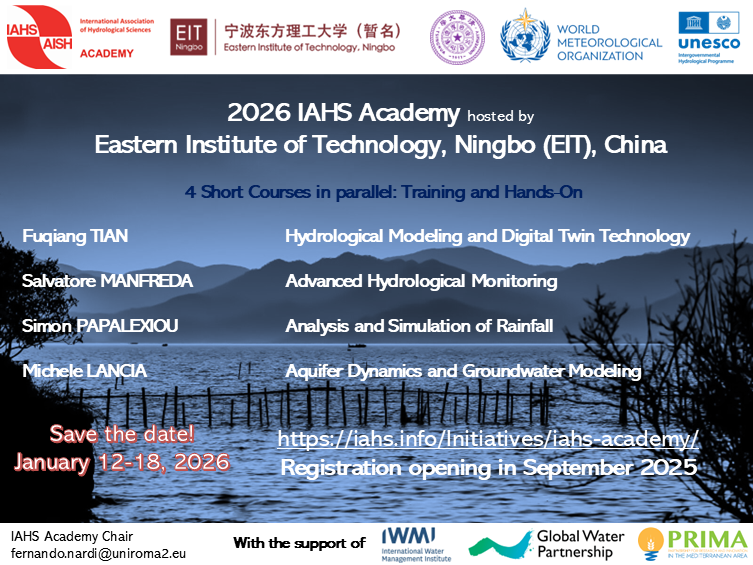
Applicants who have been notified of their acceptance for the 2026 IAHS Academy may apply to the IAHS Sivapalan Young Scientists Travel Awards (SYSTA), if they meet the requirements for the SYSTA scholarship. To ensure sufficient time for application evaluation, IAHS Academy applicants who are eligible for, and also wish to apply for, SYSTA must submit their IAHS Academy application.
Submit your SYSTA application online for the 2026 IAHS Academy application before the Friday 10 October 2025 deadline! It is so easy to apply; simply submit your application or go to our IAHS News for more details.
More information and the IAHS Academy application details can be found here. Ensuring that all applications are received & processed correctly is our priority. If you have any questions, please don’t hesitate to get in touch.
The latest articles and news from HSJ Digest
In the October issue of the HSJ Digest, our bi-monthly synopsis of the latest news from Hydrological Sciences Journal, you will find the latest articles published in HSJ and follow links to key Featured and Open Access articles. Find out more about our Hot Topics and we also profile Communications Officer Tarryn Payne, who plays a vital role in raising the profile of HSJ and of IAHS in the scientific community.

Call for Nominations - The International Hydrology Prize
Nominations are now being accepted for the IAHS-UNESCO-WMO International Hydrology Prize. The International Hydrology Prize is awarded annually by IAHS, with UNESCO and WMO, to two people who have made an outstanding contribution to hydrological science.
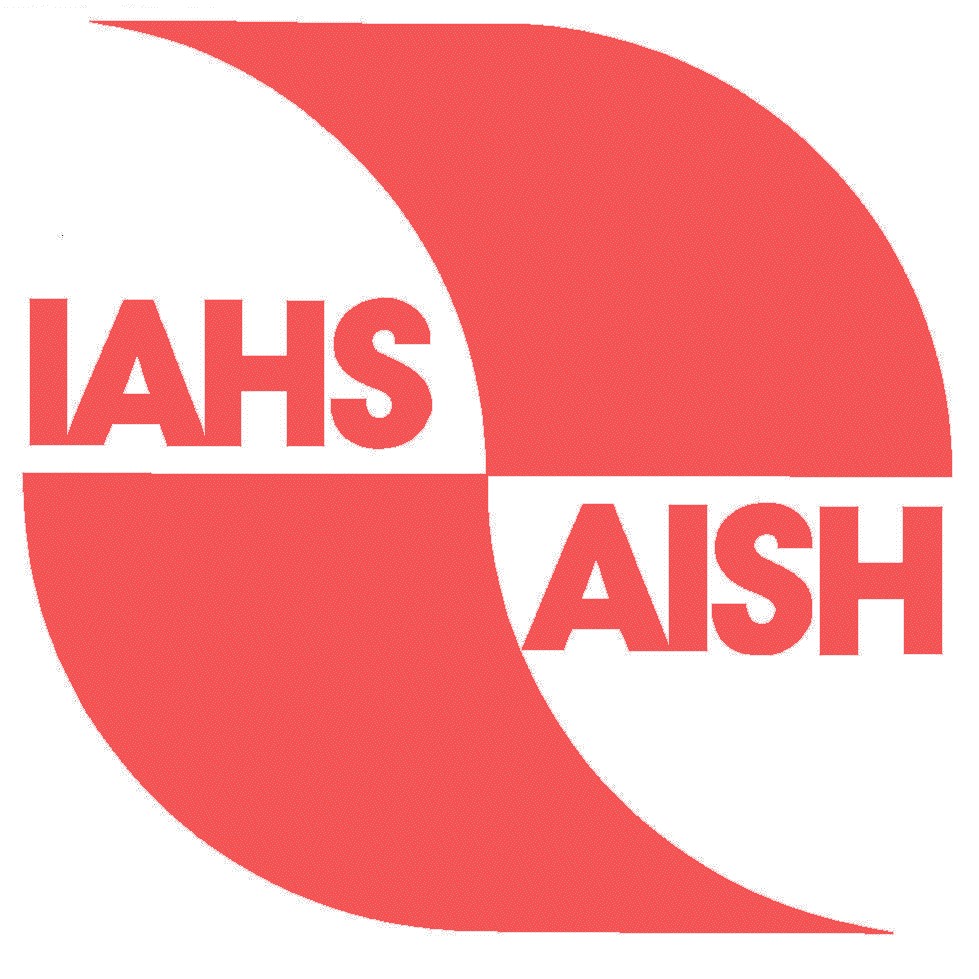
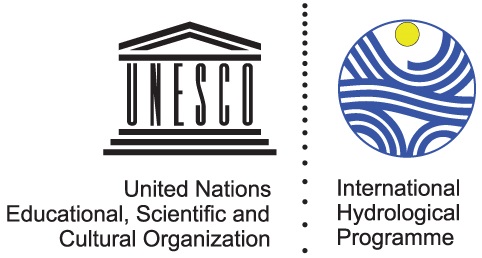
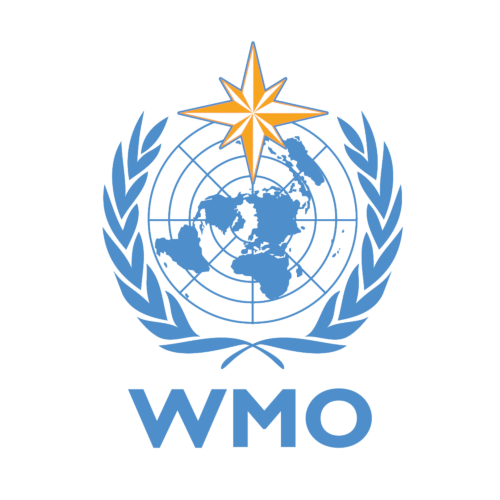
Nominations for the Prize should be forwarded to one of the National Representatives. Any such Representative can be approached, not only the ones representing your country. The list of representatives is found HERE. In addition, National Committees to the UNESCO-IHP or National Hydrological Advisors to the WMO can nominate. All nominations are forwarded to the Secretary General of IAHS for consideration by the Evaluation Committee. The Committee consists of the President and a Vice-President of IAHS and representatives of UNESCO and WMO
Since 2014, two medals have been awarded under the International Hydrology Prize: the Dooge medal and the Volker medal. Both medals are intended to distinguish outstanding achievements by hydrological scientists but with a different focus. The Dooge medal is aimed at fundamental contributions to the science of hydrology, whereas the Volker medal is aimed at outstanding applications of hydrological science for the benefit of society at large.
More information, including the list of previous awards and the nomination process, is available here.
Nominations for both of the awards should be received by the Secretary General, Jean-Marie Kileshye Onema at [email protected], no later than 31 December 2025.
